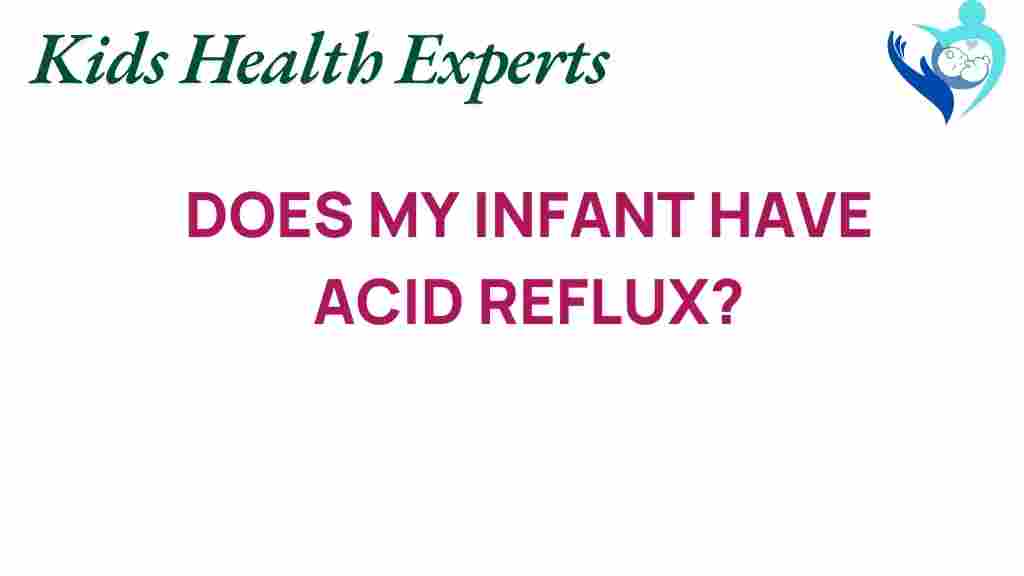Unraveling the Mystery: Could Your Infant Have Acid Reflux?
As a parent, nothing is more concerning than the wellbeing of your baby. One common issue that many new parents encounter is infant acid reflux. Although it is often dismissed as a typical phase of infancy, recognizing the symptoms, understanding the diagnosis, and knowing the treatment options can make a significant difference in your baby’s comfort and health. In this article, we’ll explore the ins and outs of infant acid reflux, providing you with essential parenting tips and pediatric advice to manage this condition effectively.
Understanding Infant Acid Reflux
Infant acid reflux, also known as gastroesophageal reflux (GER), occurs when the contents of the stomach flow back into the esophagus. This can lead to discomfort for your baby and can be a source of worry for parents. While it’s common for infants to experience some level of reflux, it’s essential to differentiate between typical reflux and more severe conditions that require intervention.
Symptoms of Infant Acid Reflux
Recognizing the symptoms of infant acid reflux is crucial for early diagnosis and management. Common signs include:
- Frequent spitting up or vomiting after feedings
- Persistent irritability or crying, especially after feeding
- Refusing to eat or difficulty feeding
- Arching of the back during or after feeding
- Chronic cough or wheezing
- Signs of discomfort when lying flat
- Poor weight gain or growth
If you notice any of these symptoms, it may be time to consult your pediatrician for further evaluation.
Diagnosing Infant Acid Reflux
The diagnosis of infant acid reflux typically involves a thorough review of your baby’s medical history and symptoms. Your pediatrician may perform the following:
- A physical examination to check for signs of reflux and overall health
- A detailed discussion about your baby’s feeding habits and behaviors
- In some cases, further tests such as an upper gastrointestinal (GI) series or pH probe study may be recommended to assess reflux severity
Understanding the diagnosis plays a pivotal role in effective reflux management.
Treatment Options for Infant Acid Reflux
Once diagnosed, your pediatrician will discuss various treatment options for managing infant acid reflux. These treatments can range from lifestyle changes to medication. Here’s a breakdown of potential treatments:
Lifestyle and Feeding Adjustments
Many infants can benefit from simple adjustments at home:
- Frequent, smaller feedings: Instead of larger feeds, try feeding your baby smaller amounts more frequently.
- Upright positioning: Keep your baby upright for about 30 minutes after feeding to help reduce reflux.
- Thickening formula: In some cases, your doctor may recommend adding a thickening agent to formula or breast milk to help keep food down.
- Burping frequently: Burp your baby during and after feedings to release any trapped air that could contribute to discomfort.
Medication
If lifestyle changes are not sufficient, your pediatrician may prescribe medications to reduce stomach acid or improve digestion. Common medications include:
- Antacids
- Proton pump inhibitors (PPIs)
- H2 blockers
Always discuss the benefits and potential side effects of medications with your healthcare provider.
When to Seek Further Help
If your baby continues to show signs of distress or if you are concerned about their growth and development, it’s important to seek further help. In some cases, persistent reflux may lead to complications such as:
- Esophagitis (inflammation of the esophagus)
- Aspiration pneumonia
- Feeding difficulties leading to inadequate nutrition
Consulting with a pediatric gastroenterologist may be beneficial for further evaluation and treatment options.
Parenting Tips for Managing Infant Acid Reflux
As a parent, managing your baby’s acid reflux can be overwhelming. Here are some practical parenting tips to help you navigate this challenge:
1. Keep a Feeding Journal
Documenting your baby’s feeding patterns, times, and symptoms can help you identify triggers and patterns that exacerbate reflux.
2. Create a Comfortable Feeding Environment
A calm and quiet space can help your baby relax during feedings, reducing the likelihood of reflux episodes.
3. Educate Yourself
Learn as much as you can about infant acid reflux and its management. Knowledge empowers you to make informed decisions about your baby’s care.
4. Connect with Other Parents
Joining support groups or online forums can provide emotional support and practical advice from other parents facing similar challenges.
5. Stay Calm
It’s essential to stay calm and patient. Remember that acid reflux is common in infants and often resolves itself as they grow.
Health Concerns Related to Infant Acid Reflux
While many infants outgrow acid reflux, there are some health concerns that parents should be aware of:
- Chronic respiratory issues such as asthma or chronic cough
- Esophageal damage over time due to repeated acid exposure
- Potential for food aversions or feeding difficulties
Regular check-ups with your pediatrician will help monitor your baby’s health and ensure any potential concerns are addressed promptly.
Conclusion
Infant acid reflux can be a challenging condition for both parents and their babies. By understanding the symptoms, pursuing a proper diagnosis, and implementing effective treatment options, you can significantly improve your baby’s comfort and wellbeing. Remember to lean on your pediatrician for guidance and support throughout this process. With the right management strategies, you can navigate the challenges of infant acid reflux and ensure that your little one thrives.
For more parenting tips and health concerns, visit our parenting resources. If you’re looking for more detailed information on reflux management, check out this external link.
This article is in the category Conditions and created by KidsHealthExperts Team
